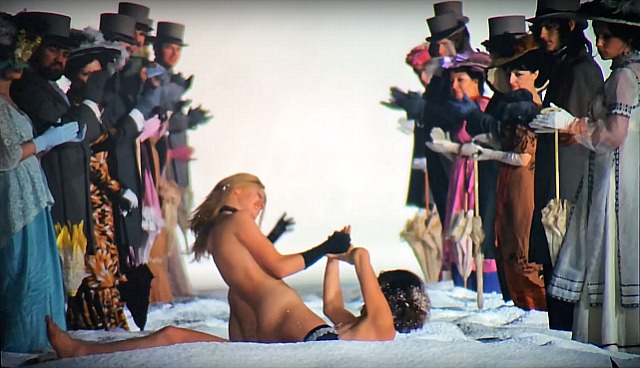I hadn’t watched A Clockwork Orange for a good five or six years, perhaps seven or eight. Quite a while. So I gave it a go yesterday, and it’s still brilliant, of course — perfectly composed and designed and punctuated to a fare-thee-well. It’s looking, I should add, a bit less for wear by current standards. It looks “okay” but not as sharp or robust as I’d remembered. It’s high time for a fresh 4K remastering as well as an actual 4K disc — why piss around at this stage? I want my Clockwork bump.
Stanley Kubrick‘s 1971 classic remains a chilly, dead-on capturing of Anthony Burgess’s 1962 novel mixed with a portrait of the chilly German-like social scientist that Pauline Kael imagined that Kubrick had become, and indeed the fellow that Kubrick had more or less evolved into since he made Dr. Strangelove seven or eight years earlier.
It’s still a crisp, clean, jewel-like film, and I’ll never stop worshipping that final shot of those well-dressed 19th Century couples clapping approval as Alex and a scampy blond cavort in the snow. But man, it’s really cold and almost induces nausea from time to time. And a fair amount of humor. I laugh every time I see that fat, middle-aged fuckface making kissy-face gestures at Malcolm McDowell‘s Alex in the prison chapel.
And anyone who says that the first act wasn’t meant as a darkly enjoyable romp is self-deluding. In the second and third acts Kubrick was lamenting or frowning upon the perverse, animal-like behavior of Alex and his three droogs, yes, but not in the first. Those who claim otherwise are ignoring the obvious out of loyalty to the legend.
Orange obviously delivered a moral point (morality without choice isn’t morality) but re-watch that first act and tell me Kubrick wasn’t getting off on some level…that he wasn’t savoring a certain enjoyment while shooting those acrobatic beatings and that horridly cruel musical rape in Patrick Magee‘s home, not to mention the one that almost happens before Alex’s gang challenges Billy Boy’s crew to a rumble.
And that long, slow third act in which Alex has to suffer an endless post-penal gauntlet…punished and clubbed and condemned ad infinitum. And those idiotic deux ex machinas! Meeting the same old alky and getting beaten up by his old friends, discovering that his old droogies have become hooligan police officers, accidentally staggering into Magee’s home a second time and apparently not recalling what had happened there before, as evidenced by Alex moronically singing “Singin’ In The Rain” while taking a bath…the mind reels.

A decade-old HE post: “Kubrick’s movies were always impressively detailed and beautifully realized. They’ve always imposed a certain trance-like spell — an altogetherness and aesthetic unity common to the work of any major artist.
“What Kubrick chose to create is not being questioned here. On their own terms, his films are masterful. But choosing to isolate yourself from the unruly push-pull of life can have a calcifying effect upon your art.
“Kubrick was less Olympian and more loosey-goosey when he made his early films in the `50s (Fear and Desire, The Killing, Paths of Glory) and early `60s (Lolita, Dr. Strangelove). I’m not saying his ultra-arty period that began with 2001: A Space Odyssey and continued until his death with A Clockwork Orange, Barry Lyndon, The Shining, Full Metal Jacket and Eyes Wide Shut, resulted in lesser films. The opposite is probably true.
“I’m saying that however beautiful and mesmerizing they were on their own terms, these last six films of Kubrick’s were more and more unto themselves, lacking that reflective, straight-from-the-hurlyburly quality that makes any work of expression seem more vital and alive.”
Posted on 6.27.10: “In her 6.17 N.Y. Times review of Brett Easton Ellis‘s just-published Imperial Bedrooms , Erica Wagner laments the numbing effect of reading books (and, she might have also said, watching movies and cable TV shows) that are saturated with flash and brutality. “The reader has to wonder what Ellis is trying to prove,” Wagner writes. “That people numbed by the poison of a society based solely on money, fame and beauty are capable of practically anything?
“If that’s not news to us it’s thanks, in large part, to Bret Easton Ellis. But what purpose can simple repetition serve?
“We, the modern audience for novels like this, have gotten over being shocked. There’s nothing left. From A Clockwork Orange to Antichrist and with American Psycho along the way, we’ve seen it all. We too have been poisoned, so that when we see pictures from Haiti or from Abu Ghraib, they appall us, perhaps, but not for long. They are part of the landscape: they are what we expect to see, and we must blunt ourselves to their power if we are to survive as feeling human beings.”












